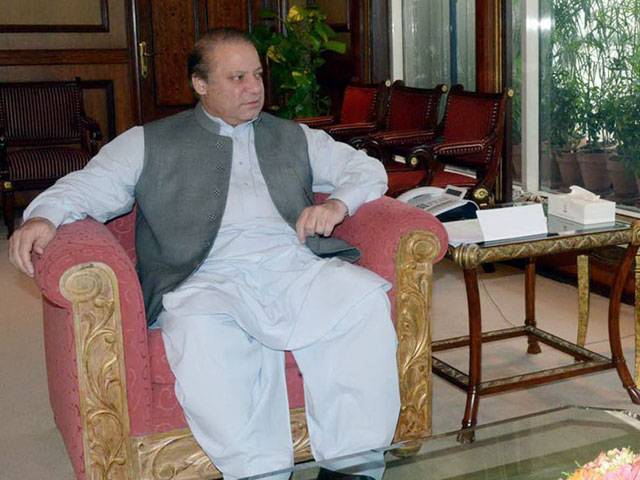ISLAMABAD - In an underlined indication of toughening the government’s stance in its approach towards terrorism, Prime Minister Nawaz Sharif on Thursday visited the Inter Services Intelligence (ISI) headquarters for background briefings from the military leadership on security issues and policy matters.
Deciphered as a reflection of the government’s apparent inclination to finally tighten the noose around the militants after failed attempts of reconciling peace, the premier’s visit comes ahead of the upcoming All-Party Conference (APC) on security.
Reportedly, the military leadership informed the PM that strong opposition from political leaderships in Khyber Pakhtunkhwa and Balochistan to military actions was seriously hampering military’s counter-terrorism and counter-insurgency drives resulting in no let up in violence. It was purportedly recommended to the PM that ‘surgical cleansing’ was necessary to take to task the non-state elements sponsoring terrorism in different parts of the country.
According to informed sources, Chief of Army Staff (COAS) General Ashfaq Parvez Kayani, ISI Director General Lt- Gen Zaheerul Islam Abbasi, ISI Deputy DG Major Gen Sahibzada Asfandyar Patodi, ISI sector commanders of all the four provinces and counterintelligence and counter terrorism officials gave briefings to the PM during his visit to the military’s premier spy agency’s headquarters located in the sector G-7.
On the occasion, PM Nawaz was accompanied by Punjab Chief Minister Shahbaz Sharif, Advisor on National Security Sartaj Aziz and Interior Minister Chaudhry Nisar Ali Khan. The COAS briefed the PM about army’s defence plan while the DG ISI, according to insiders, presented an overview of the ISI operations.
ISI DG Counter-terrorism Operations Major General Naveed Mukhtar, DG Security Major General Sajjad Rasul and DG Counterintelligence Major General Nasir Dilawar Shah briefed the premier regarding the ISI role in the military’s anti-terror drive, informed intelligence officials said. ISI sector commanders Major Gen Naveed Ahmed (Sindh), Major General Raja Aftab (Punjab), Major General Tayab Azam (Khyber Pakhtunkhwa) and Major General Iftikhar Amir (Balochistan) shared their respective inputs through technical presentations, the sources said.
An official statement quoted the PM as saying in his address to the ISI officers that no compromise would be made on Pakistan’s sovereignty and security, and terrorism would be defeated with mutual cooperation and coordination (between the state institutions).
The premier’s visit, the officials said, had much to do with the government’s inclination to get the military’s input in the anti-terror strategy to be chalked out in the APC on security. Reportedly, the government would incorporate the military’s input in the APC regarding terrorism, to be put forth before the opposition for the evaluation of a combined strategy to take on the terrorism and militancy.
In a paradigm policy shift, Pakistan Army, in its Green Book 2012-13, has identified internal or home-grown security challenges as the biggest threat to national security. The fundamental shift had seen concentration of active security measures from Eastern to Western borders.
Moreover, in his statement recorded before the Abbottabad Commission, former Air Chief Rao Qamar Suleman had said that Pakistan’s defence plan was based on certain assumptions and threat perceptions determined by certain military and civilian departments that made assessments about neighbouring and regional countries based on issues and disputes. Pakistan’s existing defence policy classifies the United States as a friendly country while it also does not perceive or categorise Afghanistan as a hostile state.
Friday, April 19, 2024
‘Political opposition’ choking anti-terror ops

9:26 AM | April 19, 2024
No damage to Iranian nuclear sites after Israeli airstrikes, says UN nuclear watchdog
12:50 PM | April 19, 2024
Ch Shafay visits Directorate of Consumer Protection Council
April 19, 2024
ECP reviews arrangements for by-elections in Punjab
April 19, 2024
Punjab’s price control initiative: A welcome step
12:33 PM | April 19, 2024
A Tense Neighbourhood
April 19, 2024
Dubai Underwater
April 19, 2024
X Debate Continues
April 19, 2024
Hepatitis Challenge
April 18, 2024
IMF Predictions
April 18, 2024
Kite tragedy
April 19, 2024
Discipline dilemma
April 19, 2024
Urgent plea
April 19, 2024
Justice denied
April 18, 2024
AI dilemmas unveiled
April 18, 2024
ePaper - Nawaiwaqt
Advertisement
Nawaiwaqt Group | Copyright © 2024





